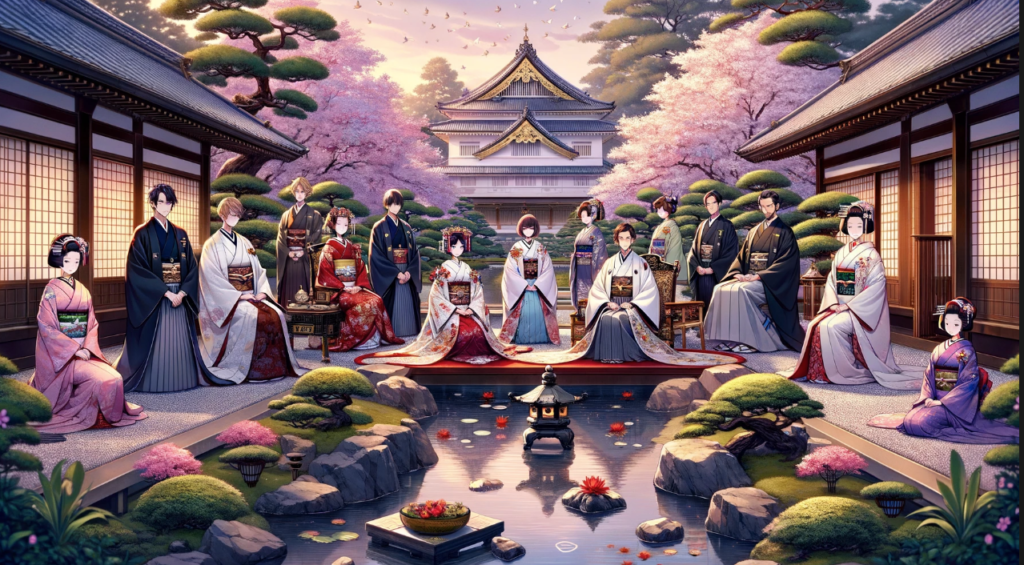
Lesson 36 Imperial Family
Topic Question:Can you describe the significance of the Imperial family in Japan?
No. 1: Introduction – First, try answering the question yourself.
The instructor will provide advice on vocabulary, grammar, and expression corrections.
Sample Answer- Let’s read aloud. Instructor will check your pronunciation and accent.
The Imperial family holds a deeply symbolic and cultural significance in Japan, embodying the nation’s history, traditions, and identity. As the oldest hereditary monarchy in the world, the Imperial family traces its lineage back to Emperor Jimmu, believed to be a descendant of the sun goddess Amaterasu, according to Shinto mythology. This divine connection establishes the Emperor as a pivotal figure in Japanese spirituality and culture. Although the role of the Emperor has evolved, particularly post-World War II, where it became largely ceremonial under the 1947 Constitution, the Imperial family continues to play a crucial role in rituals and ceremonies that are integral to Japanese society. Their presence in national events, celebrations, and disasters serves as a unifying symbol for the country, promoting values of peace, continuity, and national unity. Despite their lack of political power, the reverence for the Imperial family reflects the deep respect for tradition and the cultural heritage of Japan.
No. 2: Vocabulary Building – 5 Words to Learn and Their Meanings
Pronounce the Words Correctly (Pronunciation Training) + Make Sentences Using the Words Instantly
- Hereditary (遺伝的な, iden-teki na): Passed down through generations in a family.
“The Imperial family is known for its hereditary monarchy, with the Emperor’s role passed down through generations.”
- Lineage (系統, keitō): Direct descent from an ancestor; ancestry or pedigree.
“The Imperial family’s lineage is highly respected in Japan, dating back over two millennia.”
- Ceremonial (儀式的な, gishiki-teki na): Relating to or used for formal events of a religious or public nature.
“The Emperor’s duties are mostly ceremonial, involving participation in various traditional rituals and national ceremonies.”
- Unity (統一, tōitsu): The state of being united or joined as a whole.
“The Imperial family symbolizes national unity, serving as a figurehead that binds the people of Japan together.”
- Reverence (崇敬, sūkei): Deep respect for someone or something.
“The reverence for the Imperial family in Japan is evident in the public’s participation in Imperial ceremonies and observance of traditions.”
No. 3: Key Idiom and Example Sentences
“A pillar of society” (社会の柱): A fundamental part of the community that provides support and stability.
“The Imperial family acts as a pillar of society in Japan, embodying the nation’s traditions and values.”
“Through their symbolic presence and participation in cultural rituals, the Imperial family serves as a pillar of society, reinforcing the continuity of Japanese heritage.”
No. 4: Discussion and Exchange of Opinions on the Sample Answer
Instructor: Considering the sample answer, how do you perceive the balance between the symbolic significance of the Imperial family and the modern democratic values of Japan?
Student: [Opinions of students]
No. 5: Free Discussion on the Topic
Let’s delve deeper into the role of the Imperial family in contemporary Japan. Discuss how their public engagements and participation in cultural events influence Japanese society and international perceptions of Japan. Additionally, consider the challenges and opportunities the Imperial family faces in maintaining relevance in a rapidly changing world. How do they adapt to modern societal values while preserving their traditional roles and significance? Finally, explore the public’s interest in and media coverage of the Imperial family. How does this attention impact their private lives and the broader perception of the monarchy in Japan and abroad?







